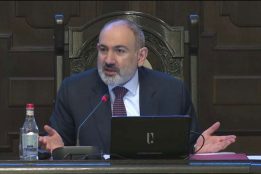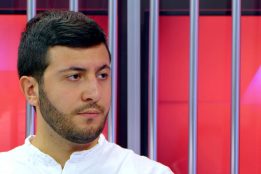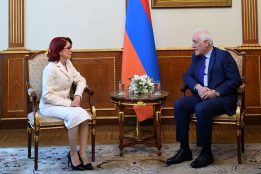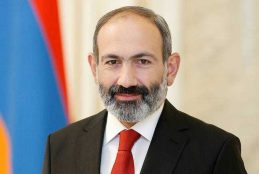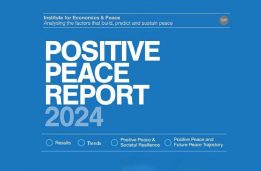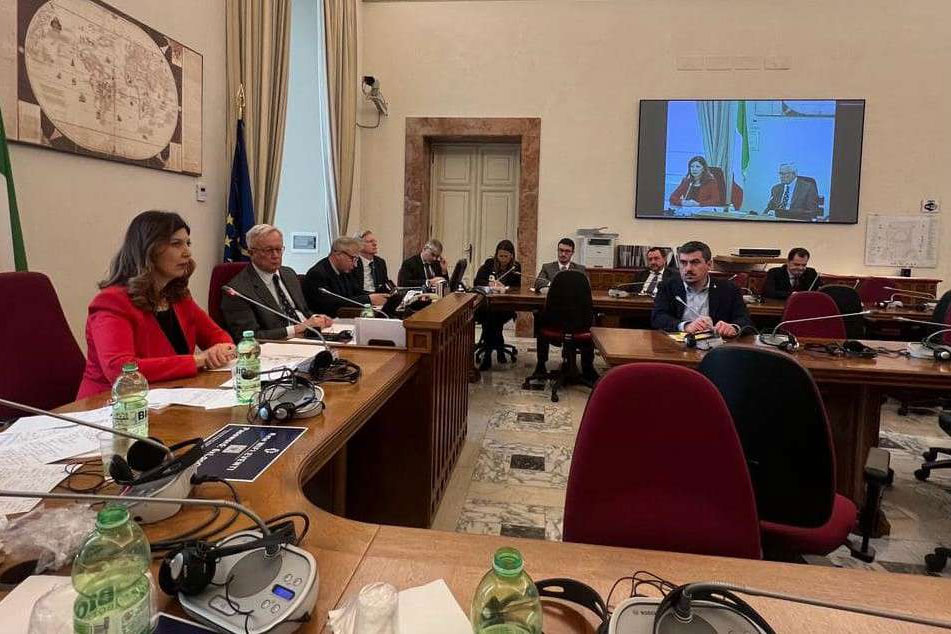
RA Ambassador to Italy Tsovinar Hambardzumyan participated in parliamentary hearings in the Permanent Committee on Foreign Relations of the Chamber of Deputies of the Republic of Italy today and delivered a wide-ranging speech on the situation surrounding Nagorno Karabakh and answered parliamentarians’ questions. The RA Embassy in Italy reports this.
“It is a double honor for me to have the opportunity to address this esteemed commission shortly after its formation. Naturally, I already know some of you, and I hope to be able to cooperate with many of you soon. I am here as a representative of the friendly country of Italy. A country that, like yours, can be proud of ancient roots, shared values, and centuries-old bilateral relations. And on this solid foundation, our friendship has been strengthened over the centuries, based on the existing mutual trust relations between our two states.
Today, Armenia and Italy enjoy a high level of political dialogue characterized by intensive mutual visits and multilateral cooperation. Our economic relations are also developing dynamically. Italian investments in Armenia are growing year by year. According to the data for the first eleven months of 2022, the trade between our countries increased by 15 percent. I attach great importance to the recently completed “Twinning” program between the parliaments of Armenia and Italy, within which intensive and strengthened cooperation between the two national assemblies was registered.
Let me say that for us, a young parliamentary democracy, it was essential that Italy was our partner in this program because our countries are close in terms of the constitution, political systems, and way of thinking. Thus, the Italian parliamentary experience transfer was significant for Armenia. Taking the opportunity of this meeting, I thank the Chamber of Deputies again for recognizing and condemning the Armenian Genocide in the previous legislature.
I express my deep gratitude to Vice President Paolo Formentini, as the first signatory of the resolution, and to Vice President Leah Quartapelle and Laura Boldrini for her sensitivity towards the Armenian people and justice on this occasion as well. A sensibility that transcends any political differences in the halls of parliament.
Despite the condemnation of history, unfortunately, we must note that the policy and methodology of persecution of Armenians by Turkey and Azerbaijan are still in full force. Since December 12, the Nagorno-Karabakh region has been surrounded by Azerbaijan. By order of the Azerbaijani government, the so-called “environmental activists” have blocked the Lachin Corridor, the only connection between Nagorno Karabakh and Armenia and the rest of the world.
The humanitarian crisis in Nagorno-Karabakh is getting worse day by day. Shortages of essential goods, food, and medicines are becoming dire. The danger of hunger is palpable. One hundred twenty thousand people were captured.
The situation is further aggravated by gas (in the middle of winter), electricity, and internet connection cuts by Azerbaijan. Kindergartens and schools are closed, hospitals have stopped operations, and powdered milk for young children is no longer available. The USA, the European Union, the UN Secretary-General, and dozens of countries have already appealed to Azerbaijan to unblock the road to Nagorno Karabakh. Recently, the European Parliament also voted with a large majority for its resolution. In response to these international calls, the President of Azerbaijan did not hesitate to confirm that the “activists” who blocked the connection did so on his instructions, ironically adding that those who do not want to be citizens of Azerbaijan can safely leave. The blockade will be opened for them.
Dear members of the Foreign Relations Committee, the Nagorno-Karabakh conflict has been the main challenge to the security and stability of our region for 30 years and now represents several political and military threats for Armenia and the entire area, and therefore also for Europe and Italy itself. The roots of this conflict go back to Soviet times. The historically Armenian Nagorno-Karabakh or Artsakh was forcibly incorporated into Azerbaijan as an autonomous region in 1921 by the Soviet dictator Joseph Stalin.
During these 70 Soviet years, the only period when Nagorno-Karabakh was part of Azerbaijan was marked by massacres, deportations, discrimination, and other forms of intolerance towards Armenians. It is enough to think that in 1920, about 300,000 people lived in Nagorno-Karabakh, more than 95% of whom were Armenians. In 1988, there were only 140,000 Armenians left, and today – only 120,000. In 1988, during the last period of the Soviet Union, the Armenians of Nagorno-Karabakh began to protest and demand the rights they had always been deprived of. Azerbaijan, not wanting peaceful demonstrations, responded with massacres of Armenians living in Sumgait (and later in Baku and Kirovabad).
It was the Sumgait pogroms that played a decisive role in the outbreak of the Nagorno-Karabakh conflict. In February 1988, armed gangs of Azerbaijanis broke into houses in broad daylight in front of the authorities, inciting anti-Armenian hatred and unleashing a “manhunt” for days. A context that painfully evoked our past marked by genocide. The atrocities committed by Azerbaijanis caused dozens of innocent victims and hundreds of wounded and disabled people. These events increased the tension between the two nations and changed the nature of the conflict.
Here I would like to remember the great Azerbaijani intellectual and writer Akram Aylisli, who, in his book “Stone Dreams,” bravely described the massacres carried out by Azerbaijanis against Armenians in Sumgait, for which the writer was deprived of all awards and titles by the government, his books were publicly burned, his son and wife were fired. And a $13,000 “bonus” was promised for cutting off the writer’s ear. Akram Aylisli was only calling for peaceful coexistence.
In practice, the Soviet Union collapsed with the outbreak of the Nagorno-Karabakh conflict. According to some experts, the latter was even the reason for it. Armenia declared its independence on September 21, 1991. On December 10, 1991, Nagorno-Karabakh also declared its liberation by the norms of international law due to a referendum called and conducted by the laws of the Soviet Union. On December 29, 1991, three days after the collapse of the USSR, Azerbaijan also officially declared independence.
Therefore, instead of the former Soviet republic of Azerbaijan, two separate state units were formed: the Republic of Azerbaijan and the Republic of Nagorno-Karabakh. Therefore, Nagorno-Karabakh was never part of independent Azerbaijan. Moreover, Azerbaijan declared its independence 19 days after Nagorno Karabakh.
In response to the people of Nagorno Karabakh exercising their right to self-determination, Azerbaijan provoked a full-scale war from 1992 to 1994, during which more than 30,000 people died on both sides. Armenians, fighting for freedom, could resist, preserve the independence of the newly created small state and guarantee its security by taking control of some surrounding territories.
Those who advance the Azerbaijan narrative about the occupation of a part of their territory by Armenians, who talk about thousands of refugees, minefields, casualties, and destruction, must be asked: Who provoked the anti-Armenian pogroms in response to peaceful demonstrations, who started the first and subsequent Karabakh wars, which caused destruction, loss of life, mutilated destinies, and thousands of refugees? Certainly not Armenia, with its 3 million population. Indeed, after the first Karabakh war, Azerbaijan became a victim of its aggression.
Armenia became independent in terrible difficult conditions: the collapse of the Soviet Union, the disorganized economy, the change of the political system, and the blockade of Azerbaijan and Turkey. Furthermore, the devastating earthquake of 1988 leveled Northern Armenia, killing 25,000 people. You will probably remember this natural disaster well because the Italians were among the first to come to the aid of Armenia with the first mission abroad of the newly created Civil Defense created by MP Zamberletti.
Does anyone believe that Armenia can declare war on Turkey and Azerbaijan? War is a bitter thing, terrible in all aspects. I have never experienced military operations directly, but I remember all my student days when I was reading a book by candlelight at minus twenty degrees. For years there was no electricity, no gas, and no water.
The 44-day war of 2020 was devastating and very different from the battle of the 90s. New-generation weapons were used, and Turkey was directly involved with its fighter jets and Bayraktar drones. Azerbaijan widely used weapons banned by international conventions, such as cluster bombs and white phosphorus bombs. In addition, Turkey recruited thousands of mercenaries who moved from the Middle East to Azerbaijan to fight against the Armenians.
The war lasted precisely 44 days, and on November 9, 2020, a tripartite declaration was signed with the mediation of the Russian Federation, which stopped the fight. However, the above statement did not bring peace to our region. To this day, taking advantage of the still fragile situation, Azerbaijan continues its war policy through incursions into the sovereign territory of Armenia and murders. It captures Armenian soldiers, appropriation and destruction of Armenian cultural and religious heritage, continuous threats against Armenia and the Armenian people, and inflaming hatred.
Azerbaijan’s actions had become even more uncontrolled since February 2022, when international attention was focused exclusively on the Ukrainian war. The subsequent aggression on the Republic of Armenia’s sovereign territory and the Lachin Corridor’s blockade on September 13 went almost unnoticed. Last September, about 250 people died due to three days of bombings and shootings. Eight thousand people, primarily women, children, and the elderly, had to leave their homes.
Densely populated cities of Armenia were subjected to targeted attacks. In gross violation of international humanitarian law, Azerbaijan captured, tortured, and killed Armenian service members. Azerbaijani media have shared shocking photos and videos of Armenian female soldiers being subjected to the most horrid barbarities, including extreme sexual assaults, murders, and mutilations.
Taking this opportunity, I would like to thank all the political forces of Italy, which strongly condemned the aggression of Azerbaijan against Armenia on September 13.
What is happening shows that the leadership of Azerbaijan is in no way interested in establishing peace and stability in the South Caucasus. The president of Azerbaijan, strengthened by the recognition as a “reliable energy partner” for Europe, continues with impunity the policy of occupying the sovereign territory of Armenia with the use of force, even making new territorial demands and threatening to occupy other regions of Armenia and even the capital Yerevan.
In recent years, the government of Azerbaijan has allocated billions of dollars to buy weapons and bribe various officials of the world, as the investigations of the Council of Europe have also shown. Azerbaijan’s top authorities have publicly stated that Armenians around the globe are Azerbaijan’s number one enemy, fueling public opinion with words of hatred and preparing them for a new war. The Azerbaijani regime always takes the last place in all rankings of human rights and freedoms worldwide, while the opposition is called the “fifth column” and imprisoned.
And is it shocking to you that the Armenian population of Nagorno-Karabakh does not want to live under the regime of this type of country? Can’t they, like the rest of us, choose to live in a democracy?
Ladies and gentlemen, I want to emphasize that the struggle for the Armenians of Nagorno-Karabakh was never for territory; the conflict has no religious or cultural nature. We are talking about the right to life of a people, which was and is under existential threat.
How can a people be forced to live in a state that hates them ethnically, in a dictatorial system ruled by the same family for more than thirty years? Nagorno Karabakh is not a territory. Nagorno-Karabakh is a nation; its population is people like us. Their struggle for freedom cost thousands of human lives, distorted destinies, shattered dreams, and unhappy childhoods. The Nagorno-Karabakh conflict, which has been going on for more than 30 years, has already claimed tens of thousands of lives. Why do our neighbors want more victims, destruction, and human suffering? Can you imagine how many young people died and how many mothers are mourning their children? And how many lives were interrupted beyond the border? They also had mothers, fathers, wives, families, and dreams…
Armenia has repeatedly stated that it is ready to start an era of peaceful development in the region. At the same time, it is clear that these efforts cannot be unilateral, and we expect an equally constructive approach and concrete steps from our neighbors. Our region is not the only region in the world where neighboring countries have had a history of war with each other. Armenia is committed to solving all conflicts in a civilized way and through negotiations and is ready to follow the European formula of neighborhood policy.
We move further away from solving the problem by instilling hatred in each new generation. We are convinced that the international community has an important role and must be decisive in the face of the criminal practice of using force to resolve international disputes. As the Roman emperor Marcus Aurelius said. “Injustice is often carried out not only by acting but also by not acting.” Emphasizing once again the determination of the Armenian side to build peace and stability in the region, we call on international partners to oblige and call on Azerbaijan through purposeful statements and actions.
– immediately remove the Lachin Corridor’s blockade and ensure international organizations’ access to Nagorno-Karabakh.
– respect the Trilateral Declaration of November 9, 2020;
– put an end to all belligerent and threatening statements, and hate speech.
– withdraw the Azerbaijani troops from the sovereign territory of the Republic of Armenia.
– release all prisoners of war.
I was taking the opportunity to raise awareness of the ongoing humanitarian crisis in the Commonwealth of Nations. They did a great job of early warning, signaling that large-scale ethnic cleansing was being prepared against the Armenians of Nagorno-Karabakh. So that tomorrow, no one will be able to say, “I didn’t know.” Thanks for your attention”.

















